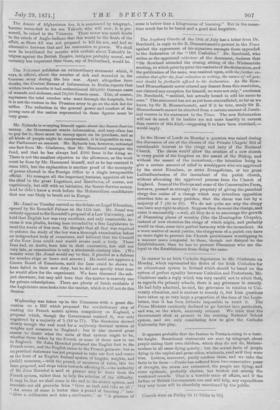In the House of Lords on Monday a question was
raised during the discussion of one of the clauses of the Private Chapels' Bill of considerable interest to the clergy and laity of the National Church. The clause would allow the erection of a new church in every parish of the kingdom on the aseent of the Bishop, and without the assent of the incumbent,—the intention being to give a certain amount of relief to worshippers who are aggrieved by the strict Ritualism, or strict Evangelicisna, or too great Latitudinarianism of the incumbent of the parish Church5 without alienating the aggrieved persons from the Church of England. Some of the Bishops and some of the Conservative Peers, however, pressed so strongly the propriety of giving the parochial clergy due notice of a change which may introduce opposition churches into so many parishes, that the clause was lost by a majority of 7 (35 to 28). We do not quite see why the clergy can have any right to object. Suppose they do resist the change, and resist it successfully : —well, all they do is to encourage the growth of Dissenting places of worship (like the Huntingdon Chapels), instead of new churches the clergy of which might, and probably would in time, come into perfect harmony with the incumbent. As a mere matter of moral justice, the clergyman of a parish can have no more right to prevent his Church parishioners worshipping in a manner more congenial to them, though not disloyal to the Establishment, than he has to prevent Dissenters who are dia- loyal to the Establishment from doing the same.
































 Previous page
Previous page